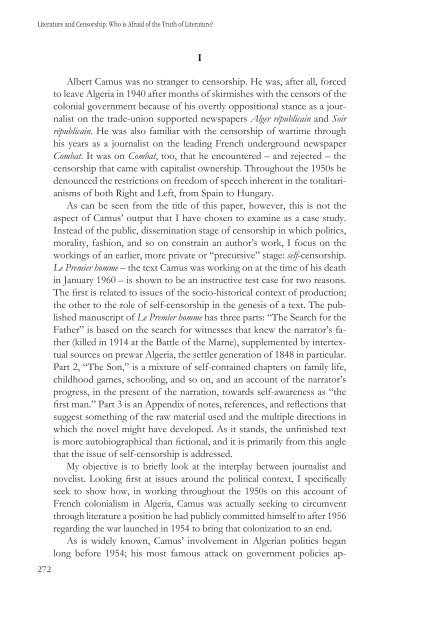Literatura in cenzura - Društvo za primerjalno književnost - ZRC SAZU
Literatura in cenzura - Društvo za primerjalno književnost - ZRC SAZU
Literatura in cenzura - Društvo za primerjalno književnost - ZRC SAZU
- No tags were found...
Create successful ePaper yourself
Turn your PDF publications into a flip-book with our unique Google optimized e-Paper software.
Literature and Censorship: Who is Afraid of the Truth of Literature?272IAlbert Camus was no stranger to censorship. He was, after all, forcedto leave Algeria <strong>in</strong> 1940 after months of skirmishes with the censors of thecolonial government because of his overtly oppositional stance as a journaliston the trade-union supported newspapers Alger républica<strong>in</strong> and Soirrépublica<strong>in</strong>. He was also familiar with the censorship of wartime throughhis years as a journalist on the lead<strong>in</strong>g French underground newspaperCombat. It was on Combat, too, that he encountered – and rejected – thecensorship that came with capitalist ownership. Throughout the 1950s hedenounced the restrictions on freedom of speech <strong>in</strong>herent <strong>in</strong> the totalitarianismsof both Right and Left, from Spa<strong>in</strong> to Hungary.As can be seen from the title of this paper, however, this is not theaspect of Camus’ output that I have chosen to exam<strong>in</strong>e as a case study.Instead of the public, dissem<strong>in</strong>ation stage of censorship <strong>in</strong> which politics,morality, fashion, and so on constra<strong>in</strong> an author’s work, I focus on thework<strong>in</strong>gs of an earlier, more private or “precursive” stage: self-censorship.Le Premier homme – the text Camus was work<strong>in</strong>g on at the time of his death<strong>in</strong> January 1960 – is shown to be an <strong>in</strong>structive test case for two reasons.The first is related to issues of the socio-historical context of production;the other to the role of self-censorship <strong>in</strong> the genesis of a text. The publishedmanuscript of Le Premier homme has three parts: “The Search for theFather” is based on the search for witnesses that knew the narrator’s father(killed <strong>in</strong> 1914 at the Battle of the Marne), supplemented by <strong>in</strong>tertextualsources on prewar Algeria, the settler generation of 1848 <strong>in</strong> particular.Part 2, “The Son,” is a mixture of self-conta<strong>in</strong>ed chapters on family life,childhood games, school<strong>in</strong>g, and so on, and an account of the narrator’sprogress, <strong>in</strong> the present of the narration, towards self-awareness as “thefirst man.” Part 3 is an Appendix of notes, references, and reflections thatsuggest someth<strong>in</strong>g of the raw material used and the multiple directions <strong>in</strong>which the novel might have developed. As it stands, the unf<strong>in</strong>ished textis more autobiographical than fictional, and it is primarily from this anglethat the issue of self-censorship is addressed.My objective is to briefly look at the <strong>in</strong>terplay between journalist andnovelist. Look<strong>in</strong>g first at issues around the political context, I specificallyseek to show how, <strong>in</strong> work<strong>in</strong>g throughout the 1950s on this account ofFrench colonialism <strong>in</strong> Algeria, Camus was actually seek<strong>in</strong>g to circumventthrough literature a position he had publicly committed himself to after 1956regard<strong>in</strong>g the war launched <strong>in</strong> 1954 to br<strong>in</strong>g that coloni<strong>za</strong>tion to an end.As is widely known, Camus’ <strong>in</strong>volvement <strong>in</strong> Algerian politics beganlong before 1954; his most famous attack on government policies ap-
















